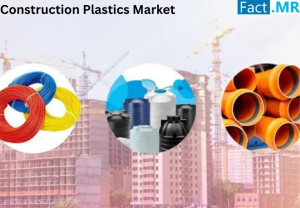Construction Plastics Market is Expected to Reach a Valuation of USD 305 Billion by 2035, FactMR Report
Construction plastics market set for strong growth, driven by urbanization, sustainability trends, advanced materials, and rising global infrastructure demand.
ROCKVILLE, MD, UNITED STATES, August 20, 2025 /EINPresswire.com/ -- The construction plastics market is undergoing a remarkable transformation, driven by rapid urbanization, advances in material science, and the growing emphasis on sustainable building practices. Over the coming decade, construction plastics are expected to play an increasingly vital role in modern infrastructure development, offering cost-effective, durable, and versatile solutions for a wide range of applications. This market analysis explores the growth trajectory, key material types, major applications, and regional trends, alongside an overview of the competitive landscape and recent developments shaping the industry.Market Forecast and Growth Trajectory
The global construction plastics market is projected to increase from USD 112 billion in 2025 to USD 305 billion by 2035, with a compound annual growth rate (CAGR) of 10.5 percent during the forecast period. This robust expansion is underpinned by the surging demand for efficient housing solutions, infrastructural upgrades, and energy-efficient construction practices. As industries and governments invest heavily in urban infrastructure, plastics are increasingly seen as indispensable due to their lightweight properties, longevity, and ability to enhance structural performance while lowering overall costs.
For More Insights into the Market, Request a Sample of this Report: https://www.factmr.com/connectus/sample?flag=S&rep_id=8925
By Plastic Type
Among the different types of plastics used in the construction sector, polyvinyl chloride (PVC) continues to dominate due to its wide applicability in pipes, insulation, windows, and flooring systems. Its balance of affordability and structural stability ensures a steady demand, particularly in large-scale housing projects and utility infrastructure.
Polyethylene (PE) and polypropylene (PP) are also gaining traction, largely because of their flexibility, resilience, and suitability for diverse construction applications. These materials are particularly favored in areas where long service life and adaptability are crucial. Increasingly, there is also a shift toward recycled and bio-attributed variants of these plastics, spurred by environmental regulations and the broader push toward sustainability in construction practices.
By Application
Pipes represent the single largest application segment in the construction plastics market, accounting for nearly half of the total demand in 2025. Their popularity stems from their durability, ease of installation, and suitability for plumbing, drainage, and heating systems. The growing demand for modern water management systems in urban and rural settings further strengthens this segment’s dominance.
Beyond pipes, construction plastics are widely used in windows, insulation materials, roofing membranes, and flooring. As building regulations worldwide increasingly mandate energy efficiency and environmental responsibility, plastics that contribute to improved insulation, thermal management, and structural integrity are gaining wider adoption. These applications highlight the material’s role not only in construction efficiency but also in enhancing the comfort and energy performance of buildings.
By Region
Regional dynamics play a critical role in shaping demand patterns. China stands out as the fastest-growing market, projected to register a strong growth rate over the forecast period. The country’s large-scale urbanization, ambitious housing initiatives, and smart city projects are driving significant demand for construction plastics, particularly in insulation and piping applications.
While China leads in growth momentum, other regions are also contributing substantially. Emerging economies across South Asia and Southeast Asia are experiencing increased adoption of construction plastics due to rising infrastructure investments and expanding urban populations. In more mature markets such as Europe and North America, regulatory frameworks emphasizing sustainability and energy efficiency are fueling demand for advanced polymer-based materials, particularly those used in retrofitting and green building projects.
Key Players and Competitive Landscape
The competitive landscape of the construction plastics market is characterized by global corporations and regional producers striving to capture growing demand. Companies such as BASF SE, Avient Corporation, Afton Chemical Corporation, and Avi-Oil India are actively shaping the market through innovation and expansion. These organizations leverage their technological expertise and global supply networks to maintain a competitive edge.
Strategies increasingly focus on sustainability and innovation. Leading players are investing in the development of recycled and eco-friendly grades of plastics that meet stringent regulatory standards while maintaining high performance. Regional production hubs are being established to improve supply chain efficiency and to serve local markets more effectively. At the same time, companies are diversifying their offerings across multiple construction applications, from structural components to finishing materials, ensuring broader market penetration.
Get Customization on this Report for Specific Research Solutions: https://www.factmr.com/connectus/sample?flag=S&rep_id=8925
Recent Developments
Several recent developments highlight the evolving dynamics of the construction plastics market. One of the most significant trends is the shift toward sustainability, with manufacturers emphasizing recycled and bio-based plastics. These initiatives not only align with global environmental goals but also meet the rising demand from consumers and regulators for greener building materials.
Infrastructure expansion in emerging economies is also creating significant opportunities. Countries across Asia are witnessing unprecedented levels of construction activity, with plastics being widely used for insulation, piping, and roofing in large-scale projects. In parallel, developed regions such as Europe are driving growth through government-led energy retrofitting programs, which require advanced polymer-based insulation and waterproofing solutions.
Technological advancements are another key driver. Innovations in polymer composites and the automation of production processes are enabling greater customization, improved durability, and enhanced cost-efficiency. These advancements position construction plastics as a critical material for future building technologies, including modular and prefabricated construction.
Check out More Related Studies Published by Fact.MR Research:
Global construction aggregate market to hit USD 0.8B by 2035 from USD 0.4B in 2025, growing at a CAGR of 6.5% during the forecast period.
Global construction lubricants market to grow from USD 21.5B in 2025 to USD 32.1B by 2035, at a 4.1% CAGR.
About Us:
Fact.MR is a distinguished market research company renowned for its comprehensive market reports and invaluable business insights. As a prominent player in business intelligence, we deliver deep analysis, uncovering market trends, growth paths, and competitive landscapes. Renowned for its commitment to accuracy and reliability, we empower businesses with crucial data and strategic recommendations, facilitating informed decision-making and enhancing market positioning.
Contact:
US Sales Office:
11140 Rockville Pike
Suite 400
Rockville, MD 20852
United States
Tel: +1 (628) 251-1583
Sales Team : sales@factmr.com
Follow Us: LinkedIn | Twitter | Blog
S. N. Jha
Fact.MR
+1 628-251-1583
sales|factmr.com| |sales|factmr.com
Legal Disclaimer:
EIN Presswire provides this news content "as is" without warranty of any kind. We do not accept any responsibility or liability for the accuracy, content, images, videos, licenses, completeness, legality, or reliability of the information contained in this article. If you have any complaints or copyright issues related to this article, kindly contact the author above.
Artificial Intelligence in Cybersecurity Market Set to Transform Threat Detection and Risk Management
Rising Vehicle Software Integration Drives Automotive OS Market to USD 20.4 Billion by 2032
CAGR of 3.5% | Alpaca Fiber Market Size, 2025 | Growing Demand and Business Outlook by 2031
Więcej ważnych informacji
 Jedynka Newserii
Jedynka Newserii

 Jedynka Newserii
Jedynka Newserii

Prawo

Kolejne polskie miasta chcą być przyjazne dzieciom. Planują stworzyć najmłodszym dobre warunki do rozwoju
Cztery miasta w Polsce posiadają tytuł Miasta Przyjaznego Dzieciom nadany przez UNICEF Polska. Dziewięć kolejnych miast czeka na certyfikację, a w ostatnich miesiącach do programu zgłosiło się kilka następnych. Na całym świecie inicjatywa została przyjęta już w ponad 4 tys. samorządów, a w Hiszpanii objęła połowę dziecięcej populacji miast. Program UNICEF-u ma na celu zachęcenie włodarzy do traktowania najmłodszych obywateli w sposób podmiotowy, respektowania ich praw i zaproszenia ich do współdecydowania o przyszłości.
Przemysł
W ciągu roku w Polsce ubyło 500 przedsiębiorstw odzieżowo-tekstylnych. Problemem są spadki zamówień z Europy Zachodniej i wzrost kosztów

Wartość rynku odzieżowego w Polsce wynosi 66,9 mld zł, z czego 10 mld zł to wartość krajowej produkcji – wynika z danych PIOT. Od czasu pandemii branża mierzy się z szeregiem wyzwań, wśród których najpoważniejsze to wzrost kosztów pracy i produkcji, przerwane łańcuchy dostaw i spadek zamówień – zarówno w kraju, jak i za granicą, a także wzrost nieuczciwej konkurencji na rynku, czyli głównie importu z Chin. Skala wyzwań sprawia, że w ubiegłym roku z rynku zniknęło 500 firm. Producenci odzieży apelują do rządu o wsparcie.
Handel
D. Obajtek: Orlen powinien być o 30–40 proc. większą spółką. Byłoby to z korzyścią dla konsumentów

Orlen jest największym polskim przedsiębiorstwem. Jego przychody ze sprzedaży w 2024 roku wyniosły blisko 295 mln zł, a rok wcześniej – ponad 372 mln – wynika z raportu Rzeczpospolitej „Lista 500”. W ubiegłorocznym rankingu Fortune 500 uwzględniającym największe korporacje znalazł się na 216. miejscu na świecie i 44. w Europie. Według Daniela Obajtka, europosła PiS-u i byłego prezesa Orlenu, spółka powinna jeszcze urosnąć, tym samym gwarantując konsumentom szereg korzyści, a także przyspieszać inwestycje m.in. w obszarze petrochemii i energetyki zero- oraz niskoemisyjnej.
Partner serwisu
Szkolenia

Akademia Newserii
Akademia Newserii to projekt, w ramach którego najlepsi polscy dziennikarze biznesowi, giełdowi oraz lifestylowi, a także szkoleniowcy z wieloletnim doświadczeniem dzielą się swoją wiedzą nt. pracy z mediami.









.gif)

 |
| |
| |
|